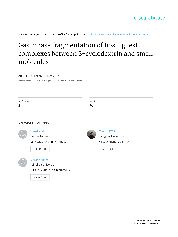摘要
Noncovalent interactions are ubiquitous in molecular interaction and supramolecular self-assembly. As a model system, host-guest complexes between beta-cyclodextrin (beta-CD) and small molecules have been extensively studied and widely used in a variety of application fields including drug transportation and fluorescence enhancement. However, details on how guest molecules interact with the beta-CD hosts to demonstrate the observed effects still remain to be further studied. In this work, we report the study of gas-phase fragmentation of host-guest complexes formed between beta-CD and small guest molecules by using collision induced dissociation (CID). The CID mass spectra of the complexes changed dramatically as the collision energy was increased. Fragmentation patterns of beta-CD complexed with different small molecules were analyzed and the differences in the presence/absence of fragment ions from the beta-CD were attributed to varied proton affinity of the small molecules. Furthermore, the CE50 values fitted from the fragmentation curves were used in the qualitative evaluation of interactions in noncovalent host-guest systems.
